My daughter was a 3-month old infant the first time we took her camping. After that, we did many other family camping trips and even a few backpacking trips. In some ways, camping with a baby is easier than staying at home with a baby. But, of course, there are a lot of things which can make or break your trip.
If you are planning a tent camping trip with a baby, here’s what you need to know to make sure you and your baby have a great experience.
Jump to:
- Planning
- Sleep Setup
- Baby Camping Gear
- Dealing with Bad Weather
- Feeding at Baby at Camp
- Hygiene and Diapering
- Baby-Friendly Camping Activities
- Safety
Planning a Camping Trip with a Baby
How Soon Can You Take a Baby Camping?
There aren’t any rules about when you can take a baby camping; even newborns can safely go on camping trips. So, the real question isn’t whether your baby is ready but rather when you feel ready.
Becoming a parent can be scary and overwhelming. Wait until you feel like you’d “gotten the hang of this parenting thing” before taking your baby camping.
You don’t want to have to figure out the ins-and-outs of bathing a baby, co-sleeping, diapering, etc. while on unfamiliar terrain. You’ll be stressed, worried, and won’t have a good time. Babies are very good at picking up on their parents’ mood: If you are calm and relaxed while camping, then your baby will handle the new environment well too.
Note: Camping with a Newborn vs. Older Baby
It’s actually easiest to camp with a baby from around 2 months to up to around 6 months. In this period, your baby sleeps a lot and is probably content to be pushed in the stroller or walked in a carrier all day. If you are breastfeeding, you don’t even have to worry about food or bottles.
With older babies (6+ months), camping gets more complicated. You have to worry about bringing baby food and dealing with grosser diapers. Once babies start crawling, then you have to constantly keep an eye on them so they don’t wander off.
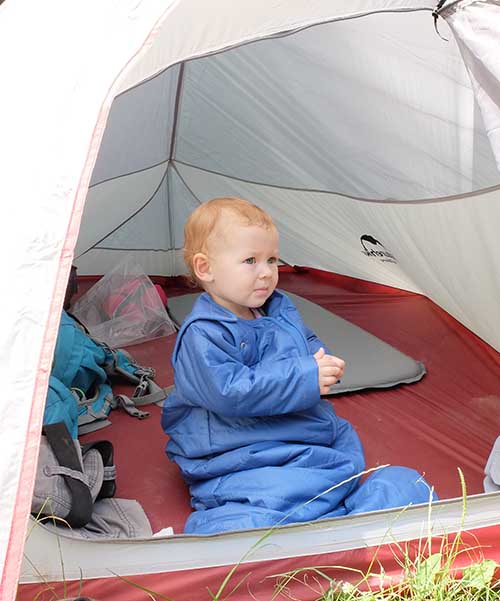
My daughter at 13 months. I found it easier to camp with her at 3 months than when she was this active!
Where to Go Camping with a Baby?
Even if you are used to backcountry camping, you will want to go somewher easy for your first camping trip with your baby. By “easy,” I mean somewhere with these features:
- Close to home. You won’t have to deal with a long car ride and can easily call it quits if things don’t go well.
- Isn’t crowded. Avoid popular places like the Grand Canyon and Smokey Mountain.
- Easy terrain and climate. I.e. not the top of a mountain or in the desert.
- No major safety hazards. Like nearby water features or is in bear country.
- Stores nearby. If you forget something, you can easily go pick it up.
Choosing a Baby-Friendly Campground
- Make sure it has the right amenities:Potable water, hot water, bathrooms, trash cans, and electricity hookups make camping with a baby easier.
- Reserve campsites far from others: This way you won’t have to worry about bothering other campers.
- Call the campground: Always call the campground before making a reservation. Let them know that you are bringing a baby and ask if there’s anything you should know.
Pro Tip: Stay At Least Two Nights
All parents agree that the first night camping with a baby is the hardest. By the second night, things are easier: everything is unpacked, you’ve figured out the sleeping situation, and are less stressed. So, ironically, if you try to do a “test run” by only camping one night, you might actually have a bad experience.
Sleep Setup
For most parents, the scariest part of camping with a baby is how they will sleep in the tent.
Let’s be clear: if you are the type of person who already doesn’t enjoy sleeping in a tent, it’s probably not going to be easier with a baby! However, it doesn’t have to be miserable.
My baby actually slept better in the tent than at home, probably because she got so tired out from being in nature all day. It probably helped that I’m generally a nicer, calmer person when I’m in nature and my positive vibes likely calmed her down too 🙂
For detailed info and tips, read how to sleep in a tent with a baby.
Have the Right Sleep Gear
The key to sleeping well with your baby is to have the right gear for your baby. At the very least, your baby will need:
- Baby sleeping bag
- Sleeping pad or portable baby camping bed
- Breathable pajamas: So your baby stays warm but doesn’t get sweaty. Merino wool PJs are great.
- Plan for accidents: Such as putting a waterproof liner inside the sleeping bag or bringing a backup sleeping bag in case a diaper explosion occurs.
You’ll probably also want a larger tent. This makes it easier to do nighttime feedings, changes and get your crying baby back to sleep. And, while some parents do have success with this, it’s generally not a good idea to co-sleep with your baby in the same sleeping bag.
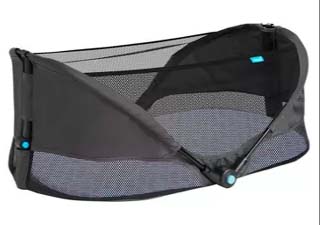
A portable bassinet like this one from Bricca is great for camping with newborns since it keeps them contained in the tent and also keeps mosquitos off of them.
Keep the Tent Organized
Keeping your tent organized will make sleeping much easier. You will be able to find bottles/diapers/etc easy, even with the headlamp. Speaking of which, you’ll be able to find the headlamp!
Staying organized is also a matter of safety. You don’t want your baby pulling something from the messy tent over her head while she sleeps. Nor do you want her to put something dangerous in her mouth…
Of course, this is easier said than done. Try to go over in your mind everything you might need to do while sleeping in the tent with your baby. Then put needed items nearby or adjust the layout.
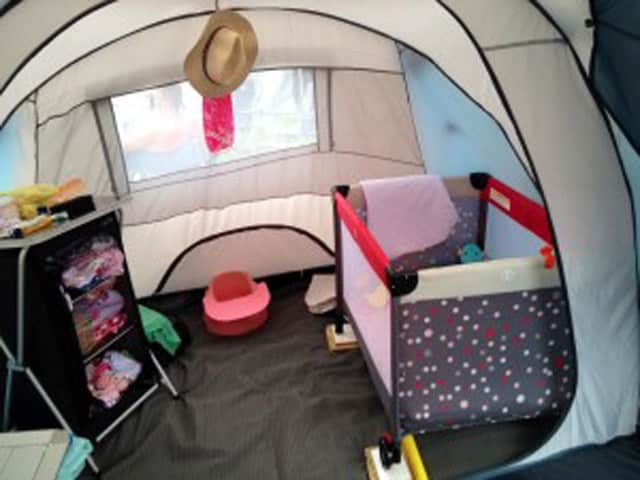
An incredibly organized tent! Image courtesy of Travel Mad Mum
Don’t Forget about Nap Setup
Babies spend a lot of the day sleeping, so you also need to plan where your baby will nap during the day. Napping in the tent usually isn’t ideal since it can get really hot inside.
Ideally, the napping place is elevated off the ground. While you can put your newborn on a sleeping pad on the ground, it is generally not a good idea. There’s no way to keep insects off of her and you’ll have to worry about other campers tripping over your baby.
Good solutions are:
- Stroller: This is what worked for my family. We got a stroller that could handle rough terrain. Our daughter would fall asleep in it almost instantly.
- Portable crib with stable legs: Most portable cribs aren’t good for camping because they could easily topple over on uneven terrain. Some people use pack n’ plays, but I found it difficult to get sleeping newborn in/out.
Note: Carriers are NOT for sleeping!
Don’t make the mistake of thinking your newborn will sleep in the carrier for the entire camping trip. You will get exhausted from constantly having your baby strapped to your chest, not to mention find it difficult to do things like eat or go to the bathroom. Bring somewhere to put your baby down!
Dealing with Nighttime Crying
Unless you have some miracle baby, your child will wake up crying at night. This is stressful enough at home, but even worse when you’ve got to worry about your baby’s screams waking up the entire campground.
While most campers are sympathetic, some campers will be annoyed by your baby’s crying. As one woman said,
“As a mum of twins I’m not unsympathetic to the demands of young children but don’t think everyone else should have to bear the noise during their relaxing break.”
Some solutions are to:
- Go camping during the low-season when it’s less crowded
- Request a campsite far away from others
- Go primitive camping instead so there aren’t any other campers around
For more, read: Is It Rude to Bring a Baby Camping?
Additional Gear
In addition to sleep gear, you may want to bring some additional gear to make camping with a baby easier. The main ones are:
- Portable playpen: This is especially useful for crawling babies so you don’t have to worry about them crawling away while you do camp chores. It’s also a good place for naps.
- Baby camping chair: Also useful for older babies, a chair means you’ll be able to feed your baby easier and have somewhere for her to sit and play. See these best baby camping chairs.
- Waterproof picnic blankets or large pads: This gives you somewhere to put your crawling baby down to play, even if the ground is muddy or wet.
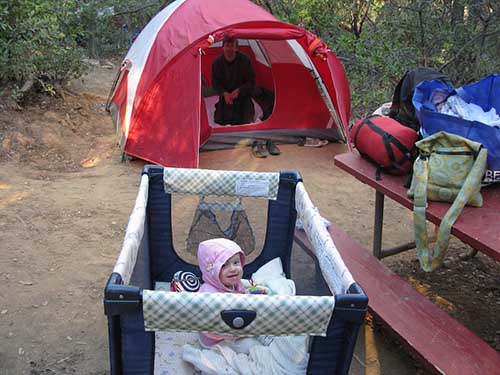
A portable play pen gives you somewhere safe to put your baby while doing camp chores
Worried you’ll forget something? See this printable baby camping gear checklist.
Stroller or Baby Carrier – Know Which Makes More Sense
Camping with a baby means you’ll need to traverse tough terrain. Your normal stroller might not be up for the task and carrying your baby the entire time simply isn’t safe or practical.
Hiking carriers are one option (and the only option for tough trails). But strollers are better for longer hikes on accessible trails. You’ll spare your back and, if your baby falls asleep in the stroller, you get to take a break.
My family actually brings both a baby carrier and a stroller on some camping trips. This gives us more flexibility.
For more, read:
Test All Gear Before Your Trip
As with all camping gear, you should always test your baby gear before your trip. This will get your baby used to the gear. It also ensures you know how to use the gear so you aren’t fiddling with carrier straps at trail base or trying to figure out how to open your baby’s portable crib.
It is good practice to test out all gear before any camping trip. But this is even more important when camping with a baby. You’ll want to take your baby for a walk in the carrier, get her in the sleeping bag, and prepare formula using your camp stove.
Even test out new diapers you will be using. I learned this the hard way. My daughter used cloth diapers at home but we decided to use disposables when traveling. The brand of disposables we got ended up being terrible and immediately resulted in a poop explosion. This could have been avoided had I tested those diapers at home first.
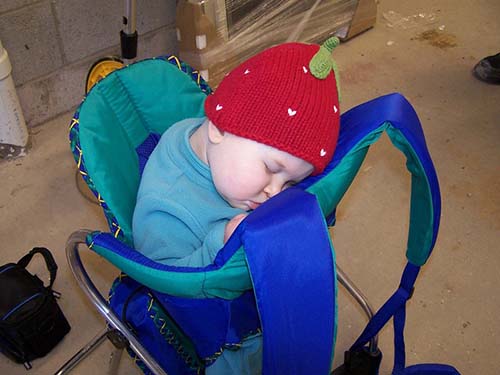
Getting used to the carrier before a camping trip!
Don’t Forget Items for YOUR Comfort
It’s easy to overthink everything your baby needs for the camping trip but forget about your needs. Bring things to make your life easier on the trip so you don’t end up exhausted from sleepless nights or breastfeeding in awkward positions. Some comfort items to consider are:
- Breastfeeding chair for inside and outside the tent
- Easy, instant meals and convenience foods
- A better sleeping mat and pillow
- Hammock
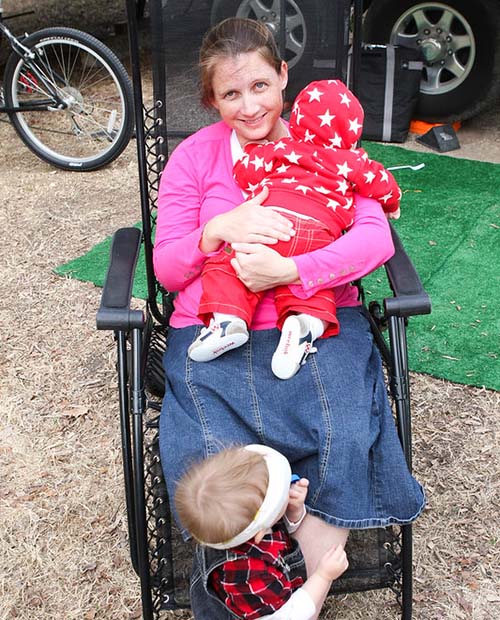
This chair makes breastfeeding at camp easier than sitting on an uncomfortable picnic table bench or wobbly camp chair
Weather
If you aren’t prepared, bad weather can absolutely ruin your camping trip with your baby. Here’s what you need to handle rain, mud, and heat.
New to camping? Then read How to Camp in the Rain and Dealing with Extreme Heat when Camping.
A Waterproof Suit Is Essential
Even if it isn’t supposed to rain on your camping trip, you will want a waterproof suit for your baby. This will allow you to put your baby on the ground without worrying that all of their clothes will end up dirty. It also keeps them completely dry, which means they will stay warm.
Also read: Best Rain Suits for Crawling Babies
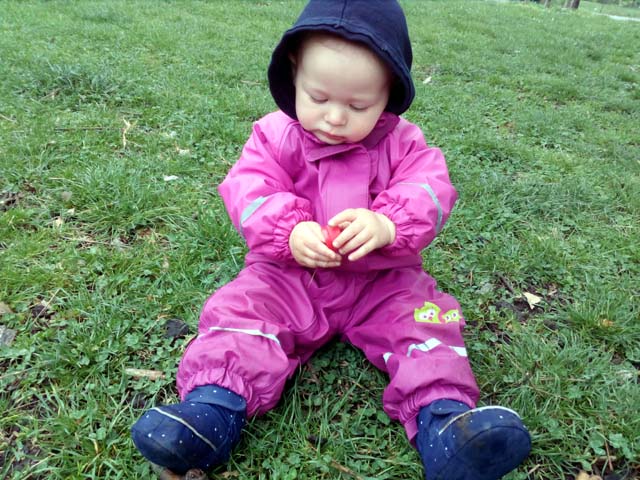
Bring Something for Sitting on the Ground
Have a big picnic blanket or mat for at camp. Then your baby can sit on the ground even if it’s wet, rocky, or cold. This will help your baby get some exercise so she hopefully sleeps better.
I also bring a foam sleeping mat with me on hikes so we have somewhere to put the baby down when we stop for breaks. The mat also doubles as a changing pad.
When you stop for breaks, spread out the blanket and let your baby wriggle/crawl around. This will help her get some exercise so she sleeps better!
A Sun/Rain Shelter
You can buy a kitchen tent or other camp shelter, but tarps are a good cheaper alternative. In hot weather, it will give you a shady place for playing or naps. In rainy weather, it will keep you dry. You can also park the stroller under the tarp shelter to keep it free of bird poop!
Also read: 27 Ways to Set Up a Tarp Shelter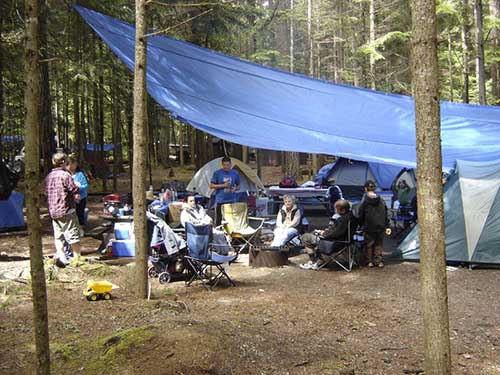
Feeding a Baby while Camping
Bottle Feeding a Baby at Camp
- Choose a campground with potable water. Then you won’t have to treat the water before making formula each time. If you are worried about the cleanliness of the water, then bring your own water for formula.
- For longer trips, also choose a campground with a dishwashing station. This will make your life easier when it’s time to wash all of those bottles.
- Prepare water the night before. Boil a kettle of water before bed and put it in an insulated flask. By morning feeding time, it will be the perfect temperature.
- Use disposable bottle inserts. While I hate disposables, these do make camping with a newborn easier. You still have to clean the nipples but won’t have to clean bottles.
- Bring LOTS of nipples and bottles. Just rinse them after each feeding. Then you can clean them all at once.
Solid Foods
Once your baby starts eating solid foods, things can get a bit more complicated. It’s hard to make your own baby food while at camp. If you have electricity at the campsite, you can get a plug-in cooler for storing homemade baby food.
Otherwise, the easiest solution is to just bring pre-made baby food. Try to choose baby food which comes in pouches instead of jars as it’s easier to transport and makes less trash.
Pro Tip: Plan simple meals for the rest of your family too. Otherwise you’ll spend an annoying amount of time on food prep and cleanup.
Hygiene and Diapering at Camp
Use Disposable Diapers,
Ideally, you should use the same diapering system that you use at home when camping with a baby. However, if you use cloth diapers and are going on a camping trip longer than 3 days, it’s probably better to switch to disposables. Otherwise, you’ll have store stinky diapers at camp, not to mention drive home with them.
Bring a Diaper Pail
Bear in mind that dirty diapers can attract insects or even animals to your campsite. It’s nice to bring a small trash can with a lid (or bucket with a lid) to use as a diaper pail. Then you will only need to dump this trash can once per day instead of trekking to the campground trash bins after each diaper bin.
Avoid Scented Items
A lot of baby items have perfumes in them. Heck, even many diapers are scented. These scents can attract insects and create a major nuisance. Only bring unscented baby items camping. And be sure to test any new items on your baby before your trip in case an allergic reaction occurs.
Buckets Make Great Baby Baths
On short camping trips, you can probably skip bath time completely. Just be sure to use a big smock during mealtimes and put your baby in a rain suit if it’s muddy. You can always wipe your baby down with wet wipes if she gets really dirty.
If you do need to give your baby a bath, then buckets work (which can also serve as your camp sink). Be prepared to haul water from the camp spigot and maybe even have to heat some water on the camp stove. You’ll feel like you are in Little House on the Prairie.
Also read: How to Give a Baby a Bath when Camping
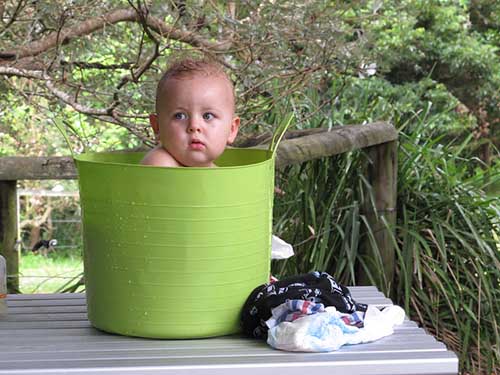
Activities
If you are used to doing activities like intense hikes, canoeing or mountain biking while camping, you’ll have to change things significantly now that you have a baby with you. That doesn’t mean you can’t thoroughly enjoy the outdoors though.
Here are some tips to make sure you enjoy activities even with a baby in tow:
- Don’t Be Overly Ambitious: It might seem doable to take a scenic drive, hit up the visitor’s center and go for a short hike in one day. But more than one activity per day is generally too much with a baby. You will end up tired and won’t thoroughly enjoy the activities. So take it easy on yourself!
- Avoid Guided Tours: Unless you splurge on a private tour, guided tours aren’t great for babies. The other members of the group won’t be thrilled that you brought a baby along. You will feel rushed when you have to stop for feedings or diaper changes. Don’t do this to yourself!
- Take Turns with Your Partner: Make a list of activities you really want to do on the trip. Have your partner do the same. Then make a plan so one person watches the baby while the other does the activity.
- Choose a Campsite which Won’t Be “Boring”: What counts as “boring” depends on the type of camping you do. Personally, I can stare at a pristine lake or mountain all day long without getting bored. So, I almost always choose to go wild camping at some beautiful secluded spot. It’s so gorgeous that I don’t need to do any activities. Other parents will have more fun at a developed campground with organized activities and other campers to socialize with.
Baby-Friendly Camping Activities
- Hiking: Hiking is the most obvious activity to do with your baby while camping. Yes, it can be a bit intimidating at first. For tips, read How to Go Hiking with a Baby
- Bird watching: Birding is the perfect activity to do while your baby sleeps. Park your baby’s stroller somewhere nice and quiet, or put her down on a pad to take a nap. Then pull out your binoculars and bird ID book and see how many you can spot.
- Plant Idenitifcation: When hiking with a baby, you will likely need to go much slower than you are used to. To make the hike more interesting, bring along a plant book. I started with learning wild edibles and their poisonous lookalikes. By the time my kid was 1 year old, I could forage us a salad for camp dinner. 🙂
- Biking: Babies can usually start traveling in bike trailers from around 9 to 12 months old. You’ll want a really good bike trailer with safety features like rollover protection. Some, like the Thule Chariot, can even double as a hiking stroller. Depending on where you go camping, you might even be able to rent a bike trailer for your baby.
- Scenic drives: Plan your scenic drives around naptimes so your baby will sleep in the car. And make sure to be somewhere baby-friendly when the drive is over and your baby is scheduled to wake up.
- Geocaching: Geocaching is basically a scavenger hunt for adults. It’s a fun activity to do with a baby because you can do it at your own pace.
- Stargazing: When baby goes to bed, get out the telescope and start looking at the stars. There are some cool apps for helping to identify stars, planets and constellations.
Safety
Keeping your baby safe while camping requires some planning. The main things you’ll need to plan for are:
Bees, Mosquitoes, Ticks and Other Bugs
Bug spray isn’t safe for newborns and most natural repellents don’t work that well. So, the only good way to keep bugs off your newborn is to use mosquito netting. Some strollers and portable cribs come with built-in bug screens. I just bought some cheap netting and used giant binder clips to hang it over the stroller.
Also read: Baby-safe bug spray and How to Remove a Tick
Sunburn
Babies’ skin is more sensitive to sunlight than adults’ skin. Ask for a campground with shade or set up a shady area using a tarp. Keep your baby’s skin covered in UV-blocking clothing and use a wide hat.
Choking Hazards
Anytime your baby is within reach of the ground (laying on a blanket, sitting in a low chair…), she might grab items from the ground and put them in her mouth. Either keep your baby high enough off the ground that she can’t reach items or be sure to sweep away any choking hazards before putting her down.
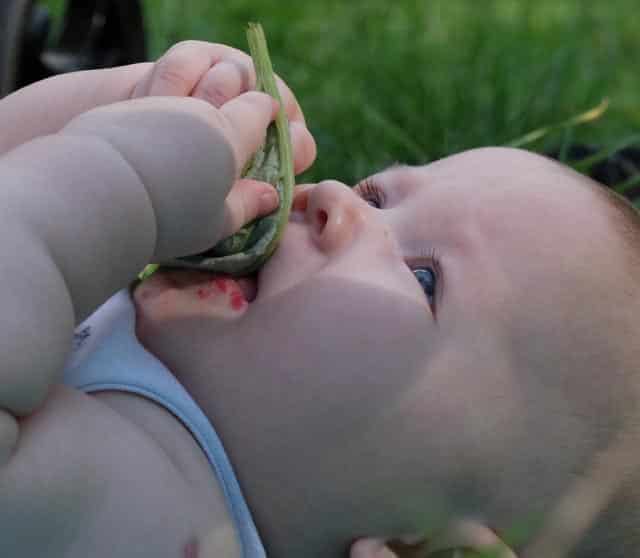
My baby about to eat a leaf on one camping trip. This is why you need to keep choking hazards out of their reach!
It’s Okay to Use a Baby Leash
I used to scorn parents who put their babies on leashes. Now I’m one of them (sorry to all the parents I gave dirty looks to!).
The harness leash means we could let our 1-year-old daughter walk on hikes by herself safely. I can actually zone out a bit and enjoy the nature without worrying that she will wander off or fall into a patch of stinging nettles because I looked away for a second.
Pro Tip: Have an Exit Plan
I don’t know too many parents who actually used their exit plans, but simply having one makes camping with a newborn less stressful. Here are some examples of exit plans:
- Camping near home: Then you can just drive home if you are having a miserable time.
- Hotel: Keep a list of hotels which are nearby and can go to.
- Campgrounds which also have rental cabins: In case sleeping in a tent isn’t going well, you can just switch to the cabin. Check the cabin availability before you go.
Image credits:
“2017 Think Outside Photo Contest entry” (CC BY 2.0) by vastateparksstaff
“DSC02177” (CC BY 2.0) by Jug Jones,
“Baby goes camping” (CC BY-NC 2.0) by santheo
“Striking Camping Trip #1” (CC BY 2.0) by Graham and Sheila
“IMG_6689” (CC BY-NC 2.0) by jayndori
“Ready for Adventure!” (CC BY-NC-SA 2.0) by D. Garding
“Road Warrior 4: Jogging Stroller” (CC BY 2.0) by ChiefG_G
“camping with babies:” (CC BY-NC-SA 2.0) by jane boles
“Helping with Mapping” (CC BY-NC 2.0) by Ad@mK
“Baby in a bath” (CC BY-NC-SA 2.0) by spelio
“DSC02177” (CC BY 2.0) by Jug Jones
Resources:
https://www.ukcampsite.co.uk/cHATTER/display_topic_threads.asp?ForumID=3&TopicID=278877
https://community.whattoexpect.com/forums/june-2018-babies/topic/adventurous-parents-camping-with-newborn-67285557.html?page=2
https://community.whattoexpect.com/forums/july-2018-babies/topic/camping-with-newborn-68343698.html?page=2
https://www.huggies.com.au/forum/1-baby/152-your-baby-general-chat/1202129
https://www.ohbaby.co.nz/forum/would-you-take-a-newborn-camping_topic41232.html
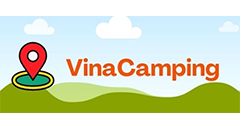

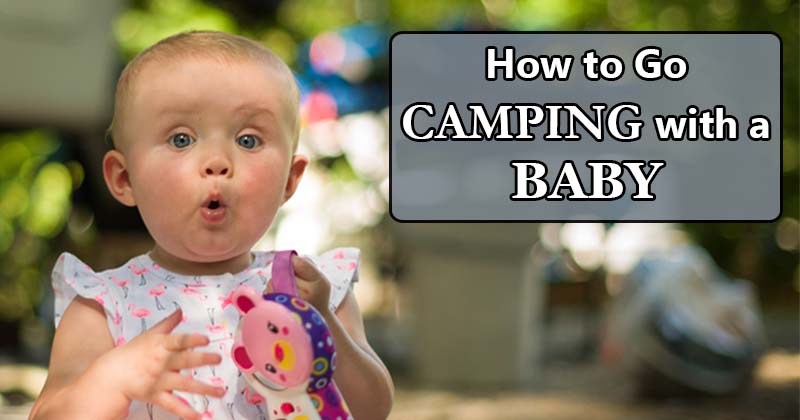
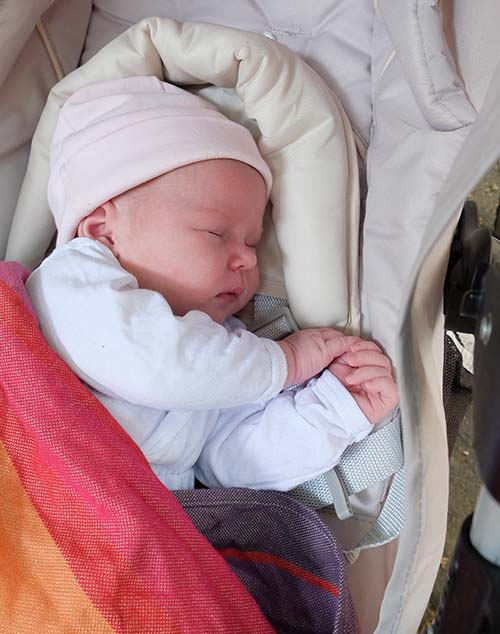
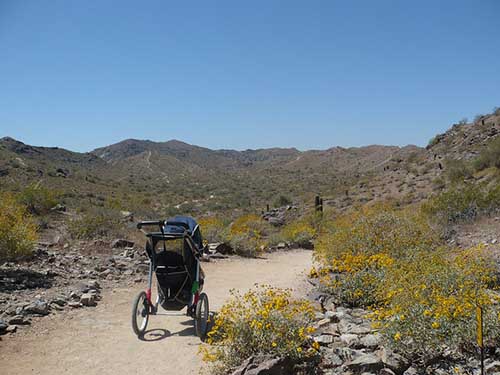
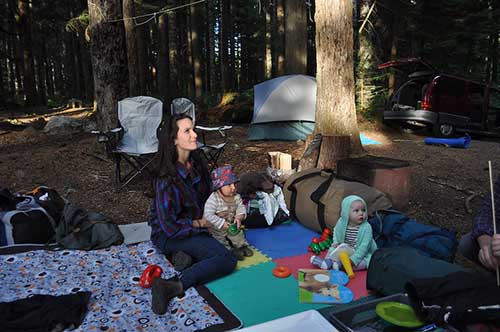
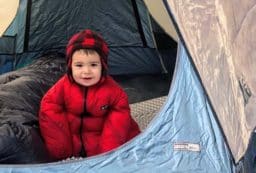
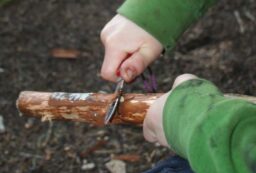
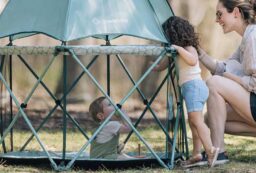
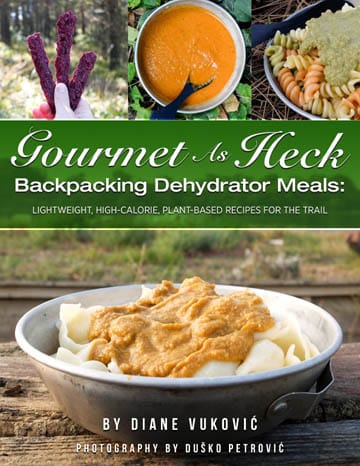
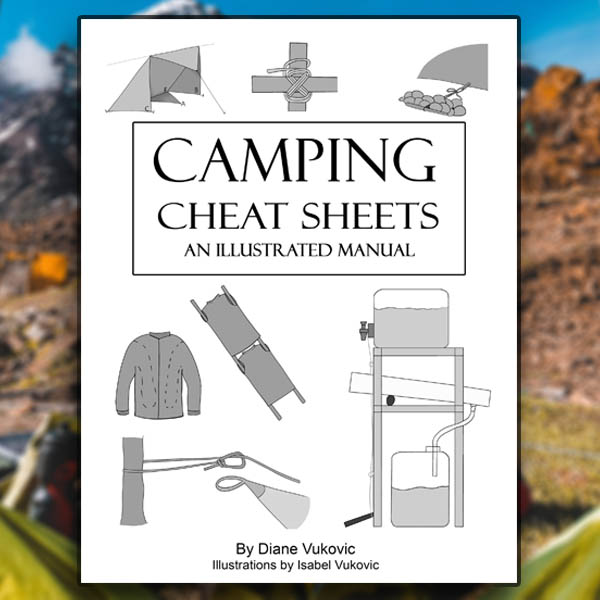
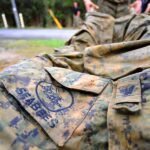

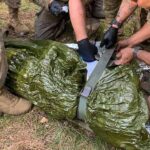
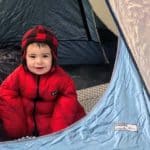
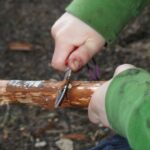
Post your comments